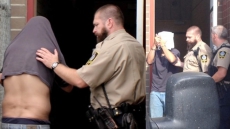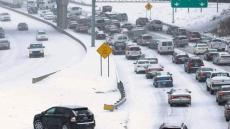It has been one year since the bodies of Francesca Matus and her American lover were found tangled together in a sugar cane field in Belize.
The urn holding the Canadian woman's ashes now sits in a niche at Toronto's Highland Memory Gardens, across from the spot where her 80-year-old mother will be buried one day.
"So we can always look at each other," said her mother, Mafalda Rino.
A local pathologist determined that the 52-year-old Matus, who lived part of the year in the Central American country, and Drew DeVoursney, 36, a former marine from Georgia, had died of strangulation.
Their murders remain unsolved. There are no suspects, and a person of interest, a Canadian man arrested shortly after the bodies were discovered, has been cleared.
"We're never going to know who killed my sister," said Matus's 50-year-old brother, Tony Rino.
As a high school teacher in Ottawa, Rino said he visited Belize many times with his students, snorkeling and kayaking off the country's gorgeous beaches. It was Rino who recommended Belize to his sister as a retirement destination, he said.
The tropical weather, relaxed lifestyle and affordable cost of living have made Belize a destination of choice for many expats from Canada, Europe and the United States.
By all accounts, Matus loved spending time in the country. She grew up in Sault Ste. Marie, Ont., in a large Italian-Canadian family, and after college moved to Toronto, where she eventually started investing in real estate. She owned five houses in the Toronto area, where her 23-year-old twin sons still live, and one in Belize — a country with one of the highest murder rates in the world.
Ottawa's travel advisory for Belize says tourists should exercise a high degree of caution due to the high rate of violent crime. A similar advisory by the U.S. Department of State says sexual assault, armed robbery and murder are common, and local police lack the resources to respond effectively to serious criminal incidents.
Just how scarce those resources are became evident soon after the bodies of Matus and DeVoursney were discovered by a farmer on May 1, 2017 — six days after the pair had disappeared.
Joe Milholen, an American who was friends with the pair, remembered being called by police to identify the bodies.
When he showed up at the field late in the afternoon, a detective told him to wait until a pathologist arrived.
"We had to wait all night for the pathologist," he said in an interview from Corozal, in northern Belize. "This guy was telling me how busy they had been ... there was a rash of murders and suspicious deaths."
The pathologist arrived around 5:45 a.m., said Milholen, but he had no supplies — no body bags or something to cart the bodies out of the bush.
"So I got to figure out where the hell do you get a body bag," he said.
Milholen went to the local hospital, but they didn't have any. He managed to secure two body bags from someone with ties to the U.S. embassy in Belize who knew Matus.
When he returned to the field, Matus lay on an old wooden door while DeVoursney was being carried out of the bush on a large piece of plywood.
"I can't lie, it was one of the most difficult things I've gone through," Milholen said, his voice trailing off. "I was frazzled — I'm still frazzled, man."
Milholen, a former deputy sheriff from Georgia, was one of the last people who saw Matus and DeVoursney alive. They had gotten together with a few other friends at Scotty's, a bar popular with expats, the night before the duo went missing. Matus had sold her ocean-front home in Corozal and was flying back to Canada the next morning to begin planning the next stage of her life: living part of the year in Italy, where she was born.
Milholen was supposed to drive her to the airport, but when he showed up, no one was home. DeVoursney's motorcycle was there, but not Matus's truck. Her suitcases were still inside the house.
Something was wrong. So he called Matus's brother in Canada, who then contacted WestJet to see if she had checked in for her flight to Toronto. The airline told Rino that Matus had checked in — so Milholen stopped worrying, until the plane landed in Toronto without Matus on board.
That's when Milholen reported the disappearances to local police.
Rino first suspected his sister was being held captive by DeVoursney, or worse.
He tracked down DeVoursney's brother, David, in Georgia.
"Is this something your brother could do?" Rino remembered asking him.
"Absolutely not," the brother responded.
Rino believed him.
The disappearances set off a massive search by local police and a large number of expats.
On the fifth day of the search, a hunter found Matus's truck — a 1998 white Isuzu Rodeo — in a field stripped of almost everything, including the battery, said Milholen. The only thing that remained was a roll of grey duct tape that Matus used to keep her headlight attached.
The next day, the bodies were found about six kilometres away. DeVoursney was still wearing the clothes from the night before — a Toronto Maple Leafs shirt someone gave him as a joke. Matus was also wearing the same clothes: pink denim shorts, a blouse and wedge shoes. Her jewelry was still on.
Once the cause of death was determined, the authorities didn't know what to do with the bodies, said Milholen. A decision had to be made immediately, he was told, or the bodies would be buried in Belize — the morgue would not accept partially decomposed bodies.
The families reluctantly agreed to have them cremated.
The murder investigation is ongoing, but the families say there have been no developments. A Canadian who was considered a person of interest in the case has also been cleared.
John Deshaies, of Barrie, Ont., who was renting the ground-floor apartment in Matus's house with his girlfriend, was arrested shortly after the bodies were discovered and spent 10 days behind bars.
"I thought I was going to die in there," the 54-year-old said in a phone interview from Belize.
He recalled being particularly scared of one of the detectives who questioned him in jail, where he said he was "just another worthless gringo."
"He pumped himself up, said he knew taekwondo and could kill a man with his bare hands," Deshaies said. "Then he yelled at me: 'Do you believe in God? You killed them!' I was like, what's happening?"
Michael Deshaies, John's son who lives in Barrie, was worried. He hadn't heard from his father after learning about his arrest.
"For three days we were trying to get the consulate to find out where my dad was, but they couldn't find him," he said. "We needed some help from the Canadian government, but got nothing. You can't just leave the guy and walk away from it."
His family found a lawyer who got him out on bail, but only after police laid charges of theft and handling stolen goods in connection with an unrelated incident.
"I loved Francesca. She was a great friend. A great person," Deshaies said. "It's a bulls--t story."
Matus's brother agreed.
"There's no way in hell John killed Francesca," Rino said.
Deshaies, who cannot leave Belize while the unrelated charges are dealt with in court, said he still has nightmares about Matus's murder. He wants to return to Canada and then figure out where to spend the winter months.
"I just can't handle the cold," Deshaies said with a laugh.
Meanwhile, Matus's family has lost hope her murder will ever be solved.
The last time they spoke with local police was in August, when the lead investigator told Rino they had yet to analyze the victims' phone records due to lack of resources. Rino was also told that police had no money to make long-distance phone calls.
"There's no way they're going to spend a dime to talk to me," Rino said.
Global Affairs Canada say 190 Canadians have been killed in foreign countries between 2013 and 2017, and that does not include cases where the families of the victims chose not to seek assistance from Ottawa.
Walter McKay, a policing and security expert, said the government's ability to help in such murder cases is limited.
"They have no powers of authority," McKay said. "My advice is don't expect any help ... don't expect justice, because you won't get it."





